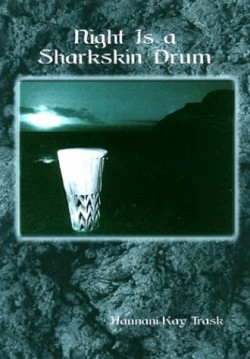
Night is a Sharkskin Drum
This is not the banal Hawai’i of tanned, smiling surfers and placid hula girls so popular with travel agents; instead, it is an island populated by a people, ancient in their culture, who are quickly being swallowed by the dual evils of colonization and tourism, reminding readers that poetry remains a tool of political persuasion. This volume is absolutely political and absolutely furious.
The author, who has also written a book of essays, From a Native Daughter: Colonialism and Sovereignty in Hawai’i, and another volume of poetry, and who produced an award-winning film, Act of War: The Overthrow of the Hawaiian Nation, is not without qualifications as an activist. She attended the UN World Conference Against Racism as a member of the Hawaiian delegation, and this sense of personal responsibility and pro-active movement is evident in the passion of her poetry.
Trask split the book into three sections, beginning with a kind of creation myth. Pele, goddess of the island, is born of fire. Hawaiian words are rife in the account, emphasizing the gap between Hawai’i and the country that claims ownership of it. The poems are a call to arms, for all of the gods to return to Hawai’i and oust the foreigners, for purification by fire, for rebirth for this small former country and its true inhabitants.
The second section becomes still more pointed, referencing the destruction caused in the name of a false country, the United States of America: “Each of us slain / by the white claw / of history; lost / genealogies, propertied / missionaries, diseased / haole. // Now a poisoned pae »ina / swarming with foreigners / and dying Hawaiians.”
No longer are the beaches home; they have instead become tourist havens, full of money and slowly roasting foreigners, causing widespread displacement. “Even prostitutes know / their professions, but natives?” Trask uses flashes of image, juxtaposing the beauty of the island (“giant mollusks / in a floating dusk,” “the crevice of rose, pleasure’s infinite sun,” “the black flash of fish”) with the hypocrisy of colonialism (“quaint Hawaiians / dressing as “natives” // in drag for the 10 o’clock / floor show,” “Japanese senator, smugly / armless from the great war, / preposterous manikin / of empire,” “forgotten ali’iü entombed / beneath grandiose hotels”). The final section reads as a series of love poems, celebrating the island of the poet’s birth.
For people of indigenous cultures, for the disenfranchised, this volume resonates. For those seeking history before it is fully lost, this volume is a call to action.
Reviewed by
Camille-Yvette Welsch
Disclosure: This article is not an endorsement, but a review. The publisher of this book provided free copies of the book to have their book reviewed by a professional reviewer. No fee was paid by the publisher for this review. Foreword Reviews only recommends books that we love. Foreword Magazine, Inc. is disclosing this in accordance with the Federal Trade Commission’s 16 CFR, Part 255.
